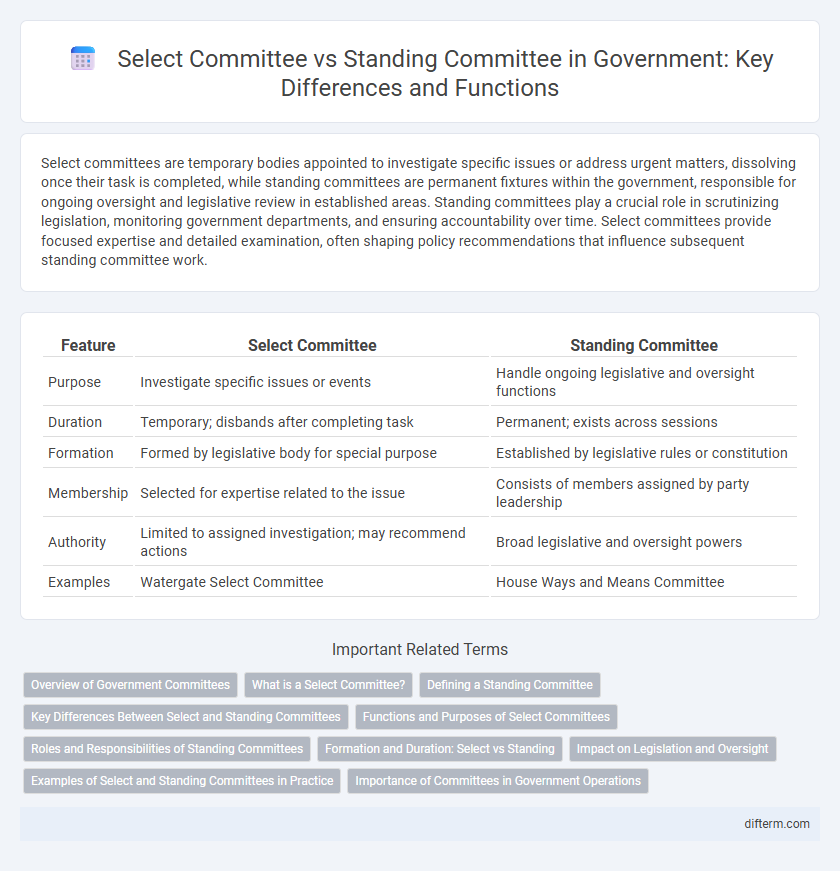Select committees are temporary bodies appointed to investigate specific issues or address urgent matters, dissolving once their task is completed, while standing committees are permanent fixtures within the government, responsible for ongoing oversight and legislative review in established areas. Standing committees play a crucial role in scrutinizing legislation, monitoring government departments, and ensuring accountability over time. Select committees provide focused expertise and detailed examination, often shaping policy recommendations that influence subsequent standing committee work.
Table of Comparison
| Feature | Select Committee | Standing Committee |
|---|---|---|
| Purpose | Investigate specific issues or events | Handle ongoing legislative and oversight functions |
| Duration | Temporary; disbands after completing task | Permanent; exists across sessions |
| Formation | Formed by legislative body for special purpose | Established by legislative rules or constitution |
| Membership | Selected for expertise related to the issue | Consists of members assigned by party leadership |
| Authority | Limited to assigned investigation; may recommend actions | Broad legislative and oversight powers |
| Examples | Watergate Select Committee | House Ways and Means Committee |
Overview of Government Committees
Select committees are temporary panels established to investigate specific issues or legislation, dissolving after completing their tasks, while standing committees are permanent bodies tasked with ongoing oversight and legislative responsibilities within specific government sectors. Standing committees handle detailed review and amendment of proposed laws related to their designated areas, such as finance or defense, ensuring continuous legislative scrutiny. Select committees often address emerging or complex topics requiring focused investigation, providing timely recommendations without the long-term scope of standing committees.
What is a Select Committee?
A Select Committee is a temporary parliamentary committee appointed to investigate or consider specific issues or legislation that fall outside the scope of standing committees. These committees have a focused mandate, often targeting urgent or specialized matters, and they dissolve after completing their assigned tasks or delivering reports. Select Committees play a crucial role in scrutinizing government policies, gathering evidence, and making recommendations to improve legislative outcomes.
Defining a Standing Committee
A standing committee is a permanent legislative body established by the government to handle specific areas such as finance, defense, or education. Its primary function is to review bills, conduct investigations, and oversee government operations within its assigned policy domain. Unlike select committees, standing committees continue their work across sessions, providing ongoing expertise and consistent legislative oversight.
Key Differences Between Select and Standing Committees
Select committees are temporary panels established to investigate specific issues or address urgent matters, whereas standing committees are permanent bodies responsible for ongoing legislative oversight and detailed scrutiny of bills. Select committees typically have a limited duration and mandate, formed for a particular purpose, while standing committees have continuous jurisdiction over particular areas such as finance, defense, or health. Membership in standing committees is usually more stable and influential in shaping legislation, whereas select committees often include members called upon for their expertise related to the temporary investigation.
Functions and Purposes of Select Committees
Select committees primarily focus on detailed examination of specific government policies, administration, and expenditure, ensuring accountability and transparency within particular departments or issues. They conduct in-depth inquiries, gather evidence from experts and stakeholders, and produce reports with recommendations to guide legislative improvements. Unlike standing committees, select committees are often temporary and designed to address particular issues that require specialized oversight or investigation.
Roles and Responsibilities of Standing Committees
Standing committees play a critical role in the legislative process by continuously overseeing government operations, scrutinizing bills, and ensuring accountability through regular reviews of policies and expenditures. Unlike select committees, which are temporary and focused on specific issues or investigations, standing committees maintain ongoing jurisdiction over particular government departments or areas, enabling comprehensive and consistent legislative oversight. Their responsibilities include examining legislation in detail, monitoring executive actions, and facilitating expert testimony to inform decisions, thereby strengthening democratic governance and transparency.
Formation and Duration: Select vs Standing
Select committees are formed for specific purposes or investigations and exist temporarily until their task is completed, often dissolving after submitting their report. Standing committees are permanent legislative panels established by rules or statutes to oversee ongoing governmental functions and maintain continuous jurisdiction over specific policy areas. The temporary nature of select committees contrasts with the enduring, recurring role of standing committees in government operations.
Impact on Legislation and Oversight
Select committees impact legislation by conducting focused investigations and producing specialized reports that influence policy changes in specific areas. Standing committees maintain continuous oversight on government operations, ensuring consistent review and amendment of legislation over time. Both committee types play crucial roles in enhancing legislative effectiveness and accountability.
Examples of Select and Standing Committees in Practice
Select committees, such as the U.S. House Select Committee on the Climate Crisis, are temporary bodies established to address specific issues or investigations, dissolving after completing their tasks. Standing committees like the Senate Judiciary Committee have permanent jurisdiction over particular legislative areas, consistently reviewing bills and policies related to the judicial system. Examples highlight how select committees provide focused oversight on emerging concerns, while standing committees maintain ongoing legislative functions within government structures.
Importance of Committees in Government Operations
Select committees, established for specific tasks and limited durations, provide in-depth examination of targeted issues, enhancing government accountability and specialized oversight. Standing committees, permanent and functioning continuously, play a crucial role in reviewing legislation, monitoring government agencies, and ensuring ongoing policy development. Both types of committees are essential for efficient government operations, enabling detailed scrutiny and balanced decision-making within legislative processes.
select committee vs standing committee Infographic

 difterm.com
difterm.com